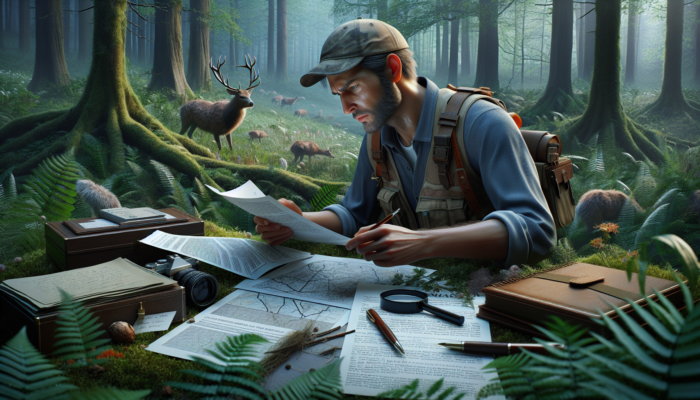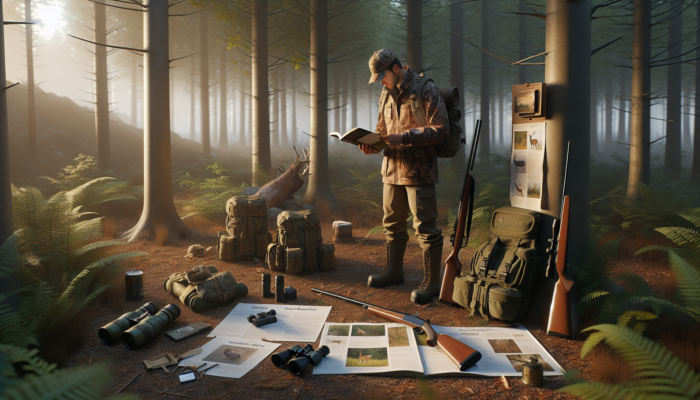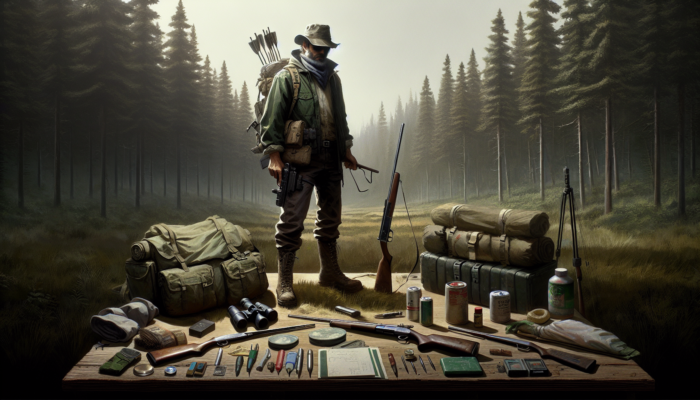Ultimate Guide for New Hunters: Embracing Responsible Hunting Practices
Essential Insights for Navigating Hunting Laws and Regulations

To embark on a fulfilling and responsible journey in the world of hunting, it is essential to grasp the intricate legal framework that governs this practice. Each state has its own distinctive set of hunting laws and regulations, crafted to safeguard wildlife populations and ensure the safety of all participants. By immersing yourself in these guidelines, you not only meet a legal obligation but also foster a culture of respect within the broader hunting community. Start your journey by exploring the resources provided by your local wildlife agency, which typically include crucial details about hunting seasons, licensing requirements, and specific restrictions for various game species.
Moreover, it’s imperative to recognize that federal regulations may also apply, particularly concerning migratory birds and endangered species. Ignorance of these laws can result in severe consequences, including hefty fines and the revocation of hunting privileges. Therefore, before embarking on your first hunting trip, allocate ample time to thoroughly research and comprehend both local and federal regulations. This foundational knowledge guarantees a responsible and ethical hunting experience that pays homage to both wildlife and the sport at large.
The Invaluable Link Between Wildlife Conservation and Ethical Hunting Practices
Many novice hunters may not fully understand the critical role that ethical hunting plays in the broader context of wildlife conservation. By actively engaging in regulated hunting practices, you contribute to vital population control measures and effective habitat management, both of which are key to sustaining a balanced ecosystem. The funds generated from hunting licenses and associated fees are often directed toward conservation initiatives that protect crucial habitats and bolster wildlife populations.
Furthermore, ethical hunters champion sustainable practices, ensuring that future generations can partake in this cherished sport. By grasping the intricate dynamics that affect wildlife populations and their habitats, hunters can make informed choices that advance conservation efforts. Embracing ethical hunting practices not only enriches your personal experience but also reinforces your role as a responsible steward of the natural world, showcasing the profound interconnectedness between hunting and conservation.
Fundamental Ethical Hunting Practices Every Beginner Should Adopt
Understanding the core principles of ethical hunting is essential for newcomers stepping into the hunting arena. Central to this philosophy is the concept of fair chase, which ensures that animals have a legitimate opportunity to escape, thus rendering hunting a respectful and challenging pursuit. This principle actively discourages tactics that unfairly advantage hunters, such as employing technology for tracking animals or hunting from vehicles.
Moreover, employing humane hunting techniques is crucial for achieving efficient and ethical kills. This necessitates a thorough understanding of shot placement and selecting appropriate calibers tailored to different game species. A dedicated hunter invests time in honing their shooting skills, ensuring they can deliver a precise shot when the moment counts. By adhering to these ethical practices, you not only enhance your hunting proficiency but also express respect for the animals you pursue and the surrounding natural environment.
Crucial Equipment Guide for New Hunters: Making Informed Choices

Choosing the Perfect Firearm for Your Hunting Adventure
Determining the right firearm is a pivotal decision for any novice hunter. With a plethora of options available, ranging from rifles to shotguns, each firearm is designed for specific types of game. For instance, if your goal is to hunt deer, a rifle chambered in .243 or .308 is highly recommended for its precision and effectiveness. Conversely, if you are drawn to upland bird hunting, a 12-gauge shotgun may be the more suitable choice.
When selecting your first firearm, consider several factors such as your physical stature, previous shooting experience, and the type of game you aim to pursue. Visiting a local gun shop or shooting range can be incredibly beneficial; knowledgeable staff can provide insights and allow you to handle various models. Always prioritize safety features and ensure that the firearm feels secure in your hands. By making a well-informed and thoughtful choice, you lay the groundwork for a rewarding and enjoyable hunting experience.
Must-Have Hunting Accessories for Every New Hunter
In addition to your firearm, there are several essential hunting accessories that every novice hunter should consider acquiring. A quality pair of binoculars is invaluable for spotting game from a distance, while a reliable knife is necessary for field dressing and processing your harvest. Investing in high-quality camouflage clothing is also advantageous, as it enables you to blend seamlessly into your surroundings, facilitating a more discreet approach to game.
A durable backpack is another crucial item for carrying your gear and any game you successfully harvest. Equip your pack with essentials such as a first aid kit, a trustworthy water bottle, and detailed maps of your hunting area. These tools not only elevate your overall experience but also bolster your safety while in the field. By arming yourself with the appropriate accessories, you can focus on the excitement of the hunt, free from concerns about the adequacy of your gear.
Cost-Effective Hunting Gear Options for Budget-Conscious New Hunters

For novice hunters, the expenses associated with acquiring gear can seem overwhelming. Fortunately, many budget-friendly hunting gear options are available that do not compromise on quality. Start by exploring second-hand gear or visiting local sporting goods stores that offer discounts specifically for new hunters. Numerous manufacturers also produce entry-level products that combine affordability with reliability.
Prioritize essential items first, gradually expanding your collection as you gain experience. For example, securing a basic firearm and ammunition should take precedence over investing in specialized gear such as premium binoculars or high-end camouflage. Additionally, many online retailers have sales or clearance sections where you can find fantastic deals. With patience and thorough research, you can build a robust hunting arsenal without stretching your budget.
Developing Fundamental Hunting Skills: A Beginner’s Path to Success
Scouting and Tracking Game: Indispensable Skills for Hunting Achievement
One of the most rewarding skills a beginner can cultivate is the ability to effectively scout and track game. Successful hunting often hinges on understanding an animal’s behavior, habitat preferences, and movement patterns. Begin by learning to identify signs of wildlife, including tracks, droppings, and feeding areas. These indicators provide invaluable insights into where animals are likely to be found, greatly enhancing your chances of a successful hunt.
Additionally, take the time to observe the landscape and consider how weather conditions can influence animal movement. For instance, deer are typically more active at dawn and dusk. By scouting your hunting area in advance and marking potential hotspots on a detailed map, you can formulate a strategic plan for your hunt. This level of preparation not only boosts your confidence but also enriches your overall hunting experience, making each outing more fulfilling.
The Importance of Wind Direction and Scent Control in Hunting
Mastering wind and scent control is vital for any hunter seeking to remain undetected. Animals possess an exceptional sense of smell, and even the faintest hint of human scent can drive them away. To minimize this risk, always position yourself with the wind blowing directly toward you, meaning you should be downwind from where you anticipate the game to approach.
A variety of products are available to assist in masking your scent, including scent-eliminating sprays and specialized clothing. However, the most effective strategy begins with maintaining good personal hygiene prior to your hunting expedition. Wash your clothing with unscented detergent and avoid using fragrant soaps or shampoos when showering. By implementing these precautions, you can significantly enhance your chances of encountering game during your hunting trips, making each outing more successful.
Fundamental Shooting Techniques for Novice Hunters
Establishing a solid foundation in shooting fundamentals is crucial for any novice hunter. Start by thoroughly understanding the basic components of your firearm, including how to load, unload, and handle it safely. Familiarize yourself with various shooting stances and grips, as these elements significantly influence your accuracy.
Consistent practice at a shooting range is vital for cultivating confidence and refining your skills. Concentrate on key aspects such as aim, breath control, and trigger squeeze. Regular practice will help you develop muscle memory, making it easier to shoot accurately when it counts. Always prioritize safety by adhering to range rules and emphasizing responsible firearm handling, ensuring that you and those around you remain safe.
Adapting to Varied Hunting Environments: Strategies for Optimal Success
Effective Hunting Strategies for Forests and Woodlands
Hunting in woodlands and forests presents unique challenges and opportunities for novice hunters. Visibility is often limited, making stealth and patience essential components of your hunting strategy. As you navigate these densely wooded areas, familiarize yourself with the terrain. Look for natural funnels such as trails, riverbanks, and clearings where wildlife is likely to traverse.
A slow and methodical approach is key. Move quietly, avoid sudden movements, and utilize available cover to your advantage. Tree stands can provide an elevated vantage point, increasing your chances of spotting game. Always remain vigilant and attuned to your surroundings; successful hunts in wooded environments often require time, patience, and a deep understanding of animal behavior.
Adjusting Hunting Techniques for Open Fields and Plains
When transitioning to open fields and plains, your hunting strategies must adapt accordingly. In these settings, visibility improves, but the challenge of remaining undetected intensifies. Proficiency in long-range shooting becomes essential in open areas, so it’s crucial to practice your accuracy with a rifle designed for effective long-distance shots.
Utilize natural cover, such as bushes or terrain features, to conceal your movements as you approach game. Consider the time of day; many animals are more active during early morning and late evening hours. Use binoculars to scan large expanses for any signs of movement, and be prepared to wait patiently for the right moment to arise. Mastering these adaptive strategies will significantly enhance your effectiveness in open-field hunting scenarios.
Specialized Techniques for Successful Waterfowl Hunting
Hunting waterfowl, including ducks and geese, presents a unique set of challenges and rewards that necessitate specialized strategies. Understanding the behaviors of these birds is essential for a fruitful hunt. Focus on identifying bodies of water where birds are likely to congregate, such as lakes, rivers, and wetlands, as these areas become prime hunting grounds.
Setting up decoys is a common tactic for attracting waterfowl. Properly positioned decoys create a realistic representation that entices birds to land nearby. Additionally, mastering the art of calling is crucial; learning to mimic the sounds of waterfowl can significantly increase your success rates. Always remain aware of weather conditions, as they can greatly influence waterfowl behavior. By employing these specialized techniques, you will greatly enhance your chances of enjoying a successful and fulfilling waterfowl hunting experience.
Preparing and Cooking Your Game: Essential Skills for Every Hunter
Mastering the Process of Field Dressing and Processing Game
Properly handling and processing your game is a fundamental skill that every hunter should master. Field dressing is the critical initial step following a successful hunt, necessary for preserving the meat and ensuring it remains safe for consumption. Begin by organizing your tools, which typically include a sharp knife and gloves. Choose a clean area that is far removed from potential contamination sources, such as water bodies or carcasses.
Start by making a careful incision along the belly, taking care not to puncture any internal organs. Remove the entrails and any unwanted parts, being cautious not to damage the hide. Once the animal has been properly field dressed, it becomes easier to transport, and the meat will cool more efficiently, minimizing the risk of spoilage. Mastering these essential steps not only demonstrates respect for the animal but also enhances your cooking experience, allowing you to fully appreciate the rewards of your labor.
Easy and Delicious Recipes for New Hunters
Transforming your harvested game into a delectable meal can be one of the most gratifying aspects of hunting. Beginners can start with straightforward recipes that emphasize the meat’s natural flavors. For example, roasting a game bird with fresh herbs and spices can enhance its unique taste while remaining simple to prepare.
Consider preparing a hearty stew using venison or other wild game; this method allows tougher cuts to become tender while infusing rich, savory flavors. Additionally, numerous resources are available that offer easy-to-follow recipes specifically tailored for beginners. Experimenting with various cooking methods will not only enhance your culinary skills but also ensure that you maximize the value of your hard-earned harvest.
Vital Food Safety and Storage Guidelines for Game Meat
Ensuring the safety and proper storage of your game is of utmost importance. After processing your meat, it is essential to refrigerate or freeze it promptly to prevent spoilage. Use airtight packaging to keep moisture and air out, which helps maintain the meat’s quality. If you plan to freeze your game, label each package with the date and type of meat for easy identification later on.
Always practice good hygiene when handling raw meat. Thoroughly wash your hands both before and after processing, and clean all utensils and surfaces with hot, soapy water. By adhering to these food safety guidelines, you can enjoy your game with confidence, knowing that you have taken the necessary precautions to ensure its safety and quality.
Fostering a Supportive Hunting Community: Connecting with Fellow Enthusiasts
Joining Hunting Clubs and Organizations for Personal Development
Connecting with fellow hunters through hunting clubs and organizations can significantly enhance your overall experience. These communities provide a wealth of knowledge, enabling you to learn from seasoned hunters while sharing your own insights. Many clubs host events such as workshops, training sessions, and group hunts, offering invaluable opportunities for hands-on learning.
Moreover, being part of a hunting community fosters a sense of camaraderie and support among members. You will encounter mentors who are willing to guide you through the early stages of your hunting journey, offering insights and tips that can expedite your learning process. These connections often lead to lasting friendships and a deeper appreciation for the sport, enriching your hunting experience.
Utilizing Mentorship Programs for New Hunters
Numerous organizations offer mentorship programs specifically designed to support new hunters. These programs pair beginners with experienced hunters who can provide essential guidance and encouragement. A mentor can help you navigate the complexities of hunting, from selecting the right gear to mastering crucial techniques.
Having a mentor not only accelerates your learning but also boosts your confidence. They can share valuable insights into local hunting spots and regulations while offering personalized advice tailored to your skill level. Engaging in a mentorship program can prove to be one of the most rewarding investments in your hunting education, equipping you with knowledge and skills that will serve you well throughout your hunting journey.
Engaging with Online Hunting Communities for Valuable Insights
In today’s digital age, online hunting communities have become invaluable resources for beginners. Platforms such as forums and social media groups provide opportunities to ask questions, share experiences, and stay updated on the latest trends in hunting. These communities often consist of seasoned hunters eager to impart their wisdom and tips.
Participating in discussions and seeking feedback from others can significantly enhance your knowledge and skills. Additionally, online communities can help you find local hunting partners or inform you about upcoming events and workshops. By leveraging these resources, you can enrich your hunting journey and cultivate connections that extend beyond the digital realm, enhancing both your skills and enjoyment of the sport.
Addressing Common Inquiries: Your Beginner Hunting Questions Answered
What essential gear do I require to begin hunting as a novice?
To start your hunting journey, you will need a suitable firearm or bow, appropriate clothing, and essential gear such as binoculars and a dependable hunting knife. Additionally, it is crucial to familiarize yourself with local regulations and secure the necessary licenses.
How can I locate hunting areas near my location?
Finding hunting areas can be accomplished by checking state wildlife agency websites, connecting with local hunting clubs, or using online maps that highlight public hunting grounds and accessible locations.
What should I know about hunting seasons?
Hunting seasons vary by state and species, so it’s essential to consult your local regulations to determine when you are permitted to hunt specific animals and ensure compliance with all legal requirements.
What safety precautions should I take while hunting?
Prioritize safety by wearing appropriate gear, adhering to firearm safety protocols, and informing someone about your hunting plans. Always maintain awareness of your surroundings and the presence of other hunters in the area.
What types of game are suitable for beginners to hunt?
Beginners can start with small game such as rabbits and squirrels, which are often more abundant and forgiving. As you gain experience and confidence, you can gradually pursue larger game options like deer or waterfowl.
How can I improve my shooting accuracy as a beginner?
Regular practice at a shooting range is essential for enhancing accuracy. Focus on maintaining proper stance, grip, and breathing techniques, and consider enrolling in a shooting class for professional guidance.
What is field dressing, and why is it an essential skill?
Field dressing refers to the process of removing the internal organs of harvested game to preserve the meat. It is crucial for preventing spoilage and ensuring that the meat remains safe for consumption.
Is it possible to hunt without a mentor?
While having a mentor can be beneficial, it is feasible to learn independently through research, online resources, and practice. Joining hunting clubs can provide additional support and guidance as you navigate your early hunting experiences.
What advantages come from joining a hunting community?
Becoming part of a hunting community offers networking opportunities, shared knowledge, and support from experienced hunters. Such connections can enhance your learning and foster camaraderie among fellow enthusiasts.
What are some effective methods for cooking wild game?
Cooking wild game involves proper handling and preparation techniques. Simple recipes like hearty stews or roasted dishes can highlight the natural flavors of the meat. Experimenting with different cooking methods will help you discover your preferences and enhance your culinary skills.
The post Hunting For Beginners: The Essential Guide to Start appeared first on Survival Bite.
The Article Hunting for Beginners: Your Essential Starter Guide Was Found On https://limitsofstrategy.com

